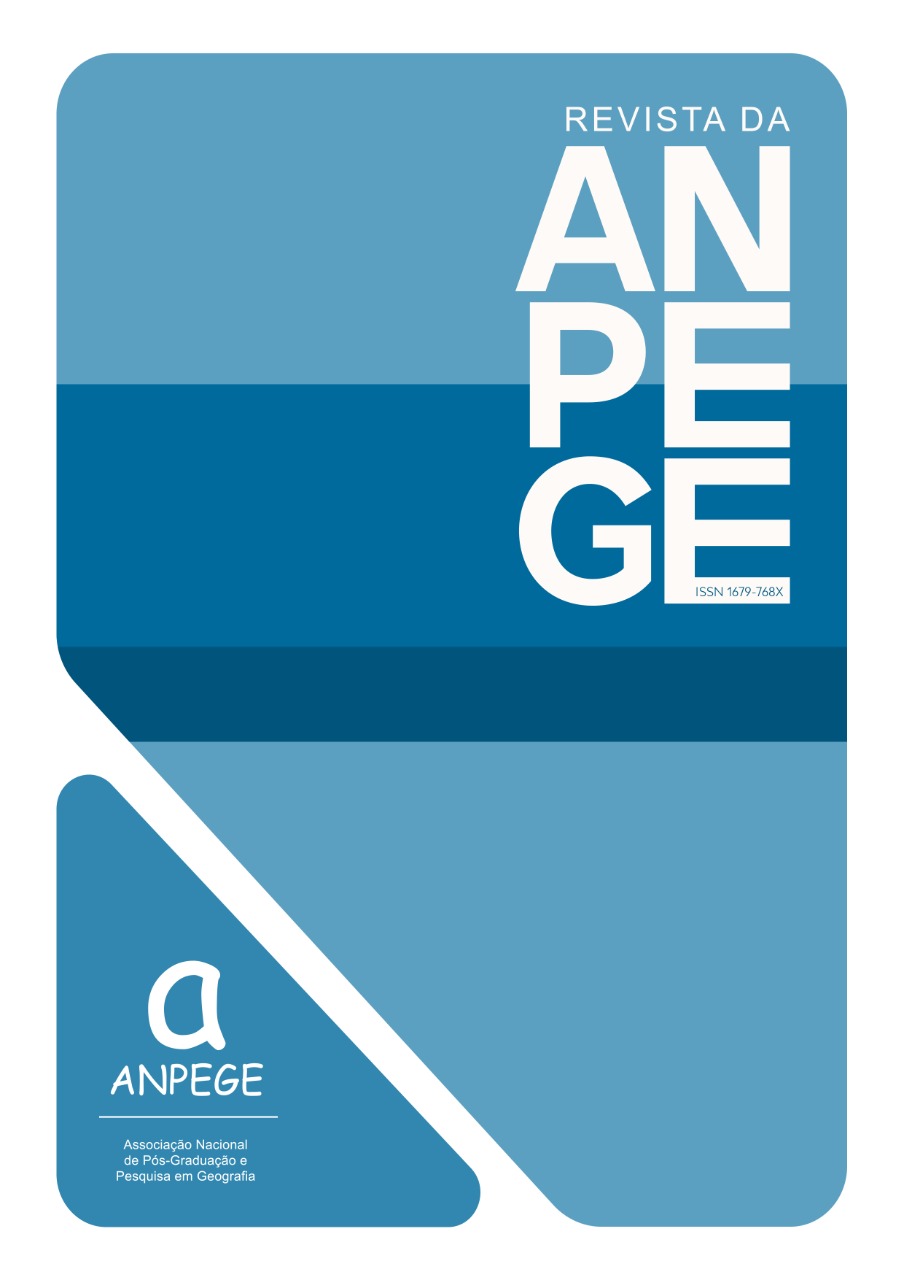Indigenous right to use the territory and patrimonial utopianisms in the Acampamento Terra Livre, Brasilia
DOI:
https://doi.org/10.5418/ra2022.v18i36.16211Keywords:
indigenous; village politics; used territory; patrimonial utopianisms; decoloniality.Abstract
Annually, the Acampamento Terra Livre-(ATL) covers the capital of Brazil with indigenous revolutionary hope, launched to the world looking for integrative action. Thus, the objective of this study is to analyze the most current strategic demands of the indigenous population in order to gather elements of the demands capable of subsidizing future public policies that will guarantee the indigenous rights to territory in Brazil. Methodologically, the study articulates: (i) the colonial approach and the geographical epistemology of existence in the dimension of heritage utopianisms linked to the indigenous struggle for territory or its basis of existence; (ii) participant observation in the ATL; (iii) the survey, recognition, and dissemination of the indigenous political agenda since the Field.
Downloads
References
COSTA, E. Utopismos patrimoniais pela América Latina: resistências à colonialidade do poder. Actas XIV Coloquio Internacional de Geocrítica. 1-32. Barcelona, España, 2016. http://www.ub.edu/geocrit/xiv_everaldocosta.pdf
COSTA, E. Ativação popular do patrimônio-territorial na América Latina: teoria e metodologia. Cuadernos de Geografía: Revista Colombiana de Geografía, Bogotá, 26(2), 53-75, 2017. https://revistas.unal.edu.co/index.php/rcg/article/view/59225/pdf DOI: https://doi.org/10.15446/rcdg.v26n2.59225
COSTA, E. Patrimonio-territorial y territorio de excepción en América Latina, conceptos decoloniales y praxis. Revista Geográfica Venezolana, Mérida, 62(1), 108-127, 2021. http://www.saber.ula.ve/handle/123456789/47523 DOI: https://doi.org/10.53766/RGV/2021.62.01.05
COSTA, E. & SCARLATO, F. Geografia, método e singularidades revisadas no empírico. GeoUSP, Espaço e Tempo, 23(3), 640-661, 2019. 10.11606/issn.2179-0892.geousp.2019.161552 DOI: https://doi.org/10.11606/issn.2179-0892.geousp.2019.161552
COSTA, E & ALVARADO, I. Territorio usado, turismo e cinema: proposta metodológica. Finisterra, Revista Portuguesa de Geografia, Lisboa, 56(118), 175–198. https://doi.org/10.18055/Finis22285
COSTA, E. & MONCADA, J. Decolonialidad originaria latinoamericana y condicionamiento barroco del territorio novohispano: conventos, presidios y pueblos de indios. Cuadernos de Geografía: Revista Colombiana de Geografía, Bogotá, 30(1), 3-24, 2021. https://doi.org/10.15446/rcdg.v30n1.80924 DOI: https://doi.org/10.15446/rcdg.v30n1.80924
CUEVAS-MARÍN, P. Memoria colectiva, un proyecto decolonial. In: Catherine Walsh (ed.). Pedagogías decoloniales. Prácticas insurgentes de resistir, re-existir y re-vivir. Quito: Abya-Yala, p. 69-103), 2013.
FERNANDES, B. Campesinato e agronegócio na América Latina: a questão agrária atual. São Paulo: Clacso -Editora Expressão Popular, 2008.
LEÓN PESANTEZ, C. Hacia una posible superación de la metahistoria de lo latinoamericano. In: Catherine Walsh (ed.). Pensamiento crítico y matriz (de)colonial. Reflexiones latinoamericanas. Quito: Abya-Yala, p. 111-133, 2005.
MIGNOLO, W. Desobediencia epistémica. Retórica de la modernidad, lógica de la colonialidad, gramática de la descolonialidad. Buenos Aires: Del Signo, 2010.
QUEIROZ, P. & MAIA, B. Território usado, saúde indígena e Covid-19 no Brasil. PatryTer, Brasília, 4(8), 60-79, 2021. https://doi.org/10.26512/patryter.v4i8.35493 DOI: https://doi.org/10.26512/patryter.v4i8.35493
SANTOS, M. et al. O papel ativo da geografia, um manifesto. Biblio 3W. Revista Bibliográfica de Geografía y Ciencias Sociales, 270(1), 1-10, 2001. http://www.ub.edu/geocrit/b3w-270.htm
SANTOS, M. El territorio: un agregado de espacios banales. Boletín de Estudios Geográficos, (96), 87-96, 2000.
SANTOS, M. Por uma outra globalização. Rio de Janeiro: Record, 2000a.
SILVEIRA, M. Globalización y territorio usado: imperativos y solidaridad. Cuadernos del Cendes, Caracas, 25(69), 1-17, 2008. https://www.redalyc.org/pdf/403/40311392002.pdf
SOBREIRO FILHO, J. Quando nasce uma mãe e sua luta por todos: breve análise sobre a formação do movimento nacional campesino indígena (MNCI) na Argentina. Revista Nera, (57), 104-126, 2021. https://doi.org/10.47946/rnera.v0i57.8498 DOI: https://doi.org/10.47946/rnera.v0i57.8498
SOUZA, M. Territorio usado, rugosidades e patrimonio cultural: ensaio geográfico sobre o espaço banal. PatryTer, Brasília, 2(4), 1-22, 2019. https://doi.org/10.26512/patryter.v2i4.26485 DOI: https://doi.org/10.26512/patryter.v2i4.26485
WALSH, C. Interculturalidad y colonialidad del poder. In Santiago Castro-Gómez; Ramón Grosfoguel (ed.). El giro decolonial. Reflexiones para una diversidad epistémica más allá del capitalismo global. Bogotá: Universidad Central, p. 47-62, 2007.
WALSH, C. Interculturalidad crítica y (de)colonialidad. Quito: Abya-Yala, 2012.
Downloads
Published
How to Cite
Issue
Section
License
Autores que publicam nesta revista concordam com os seguintes termos:Autores mantêm os direitos autorais e concedem à revista o direito de primeira publicação, com o trabalho simultaneamente licenciado sob a Creative Commons Atribuição-NãoComercial-CompartilhaIgual 3.0 Brasil que permitindo o compartilhamento do trabalho com reconhecimento da autoria do trabalho e publicação inicial nesta revista.
Autores têm autorização para assumir contratos adicionais separadamente, para distribuição não exclusiva da versão do trabalho publicada nesta revista (ex.: publicar em repositório institucional ou como capítulo de livro), com reconhecimento de autoria e publicação inicial nesta revista.
Autores têm permissão e são estimulados a publicar e distribuir seu trabalho online (ex.: em repositórios institucionais ou na sua página pessoal) a qualquer ponto antes ou durante o processo editorial, já que isso pode gerar alterações produtivas, bem como aumentar o impacto e a citação do trabalho publicado (Veja O Efeito do Acesso Livre em http://opcit.eprints.org/oacitation-biblio.html.)
Authors who publish with this journal agree to the following terms:
Authors retain copyrights and grant the Journal the right of first publication with the work simultaneously licensed under a Creative Commons Atribuição-NãoComercial-CompartilhaIgual 3.0 Brasil that allows others to share the work with an acknowledgement of the work's authorship and initial publication in this Journal.
Authors are permitted to enter into separate, additional contractual arrangements for the non-exclusive distribution of the Journal's published version of the work (e.g., post it to an institutional repository or in a book chapter), with an acknowledgement of authorship and initial publication in this journal.
Authors are permitted and encouraged to publish and share their work online (e.g., in institutional repositories or on their website) prior to and during the submission process, as it can lead to productive exchanges, as well as increase the impact and citation of published work (See The Effect of Open Access - http://opcit.eprints.org/oacitation-biblio.html.)




